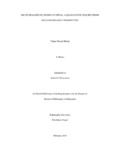
Please use this identifier to cite or link to this item:
https://hdl.handle.net/20.500.14301/101| Title: | DECENTRALIZED PLANNING IN NEPAL: A QUALITATIVE INQUIRY FROM SELF-GOVERNANCE PERSPECTIVE |
| Authors: | Bhatta, Thakur Prasad |
| Citation: | Thakur, P. B. (2019).Decentralized Planning in Nepal: A Qualitative Inquiry From Self-Governance Perspective |
| Issue Date: | Feb-2019 |
| Publisher: | Kathmandu University School of Education |
| School: | SOED |
| Department: | DOEL |
| Level: | Ph.D. |
| Program: | PhD in Educational Leadership |
| Abstract: | The decentralized planning intertwined with the decentralization reforms faces many challenges in its implementation. It largely relies on the central level power holders who reluctantly enforce the decentralization reform. Why the implementation of the decentralized policy often fails is a pertinent research issue. This thesis explores the emergent issues of decentralized planning policy and its practice in Nepal from the perspective of local self-governance in a federalized context. This study is founded in the qualitative research paradigm which follows relativist ontology and interpretive epistemology. It has employed the case study as a methodological strategy. To generate data, this study conducted qualitative interviews, made non-participant observations and carried out document analysis. Considering the multidisciplinary nature of the research problem, this study draws various conceptual and theoretical notions mainly from power theories, institutional analysis, decentralization, governance and planning theories. Despite various decentralization reforms over the decades, the study found that the local bodies did not get autonomy while practising the decentralized planning ii policy. The central level, using multiple forms of power (Lukes, 2005), undermines the virtues of self-governance as it intends to control the mobilization of the resources for local development. The perceptions of local stakeholders of the decentralized planning policy as ‘conceptually sound but ineffective in implementation’ reflects the disjuncture of policy and practice. Such an ineffective practice makes the decentralized planning policy only a legal ritual that erodes the trust of the local people in the local governments. While there is a low level of planning capacity of the local governments, the central level prefers controlling the local levels rather than enhancing the planning capacity of the local governments. This is viewed as an opportunity for the central level to control and interfere in the local levels and mobilize the development resources of the local levels at its discretion. Even after the establishment of federal governance, as the study explored its initial practice in Nepal, it reveals the reluctance of the central level in implementing the decentralized policy. This leads to the conclusion that the central level which is entrenched in the deep-rooted centralist mentality undermines the accountability and constrains the autonomy of the local level. In such circumstances, struggles of the local level to overcome the influence of informal institutions (Rothstein & Tannenberg, 2015) become crucial for the effective implementation of a decentralized policy. The implication of the study is to educate people to develop a collaborative planning culture which is essential for designing and implementing the policy and programmes of local development and local self-governance. ________________________ 26 February, 2019 Thakur Prasad Bhatta Degree Candidate iii ACKNOWLEDGEMENTS After the accomplishment of this research, I realized that it is primarily a bilateral academic project. I would never be able to come to this stage of this long term project without the continuous and contemplative guidance of my Thesis Supervisor Prof. Dr. Mahesh Nath Parajuli. I am deeply indebted to him and express my immense appreciation. I am thankful to my External Examiner Dr. Lava Deo Awasthi for his insightful comments that enhanced my thesis. My gratitude goes out to Prof. Dr. Bal Chandra Luitel, Prof. Dr. Laxman Gnawali, Prof. Dr. Jai Raj Awasthi and Assoc. Prof. Dr. Dhanpati Subedi for their valuable comments and feedbacks. I am sincerely grateful to Assoc. Prof. Dr. Prakash Chandra Bhattarai for his encouragement and counsel at crucial stages of my research. I express my profound thanks to my friend Guna Bahadur Waiba Lama for his esteemed support in the fieldwork and largely to Dr. Dinesh Chandra Devkota for his persistent encouragement. Similarly, I am thankful to Bhuvaneswor Dhungana, Kanchha Ram Lama, Padam Dulal, Yam Nath Giri and Mukesh Sharma for their kind support. In addition, my colleagues Rebat Dhakal, Dr. Indra Mani Yamphu and Prabin Raj Gautam, deserve my sincere thanks for their academic support. I thank Dil Bahadur Shrestha at KUSOED for his administrative support. Also, I am obliged to Bal Devi Pokhrel, Ishwori Dahal, and Dr. Bhawana Bhatta for their valuable help. At last, I would like to express the utmost appreciation to my wife Matisara, for her continuous succour, daughter Anupa, and son Agraj, without whom I would have been unable to complete this iterative and enduring task. |
| URI: | http://101.251.6.110:8080/handle/20.500.14301/101 |
| Appears in Collections: | Theses |
Files in This Item:
| File | Description | Size | Format | |
|---|---|---|---|---|
| PhD_Thakur p_Bhatta.pdf | 711.88 kB | Adobe PDF |  View/Open |
Items in DSpace are protected by copyright, with all rights reserved, unless otherwise indicated.